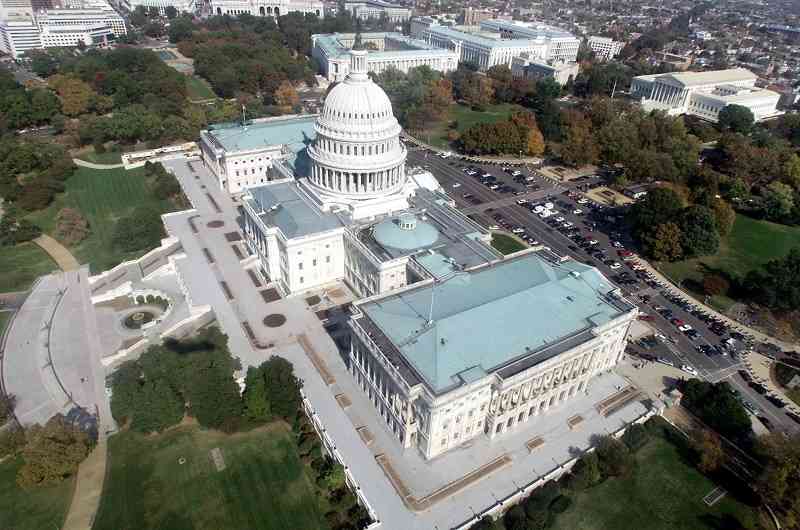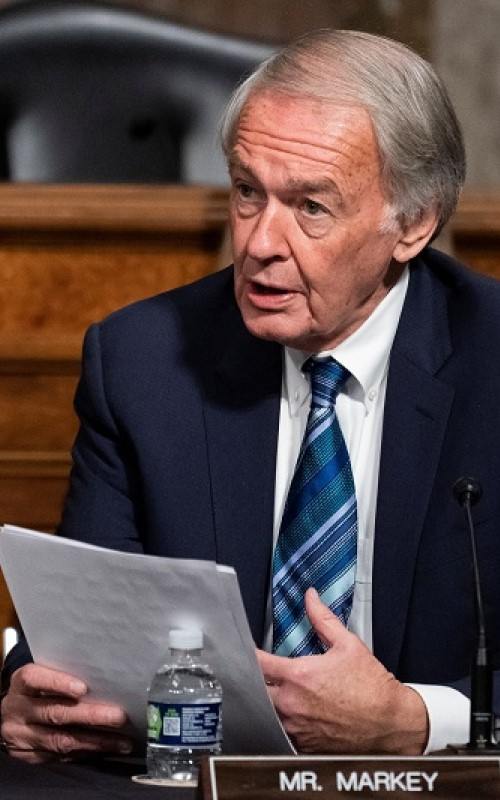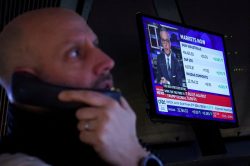
Aerial view of United States Capitol Building’s House of Representatives side as seen from a US Marine Corps helicopter from the House of Representatives side, October 24, 2001.
17:16 JST, August 14, 2022
WASHINGTON – The world has changed dramatically since the last time Congress considered climate legislation.
Last time, it sought to cap greenhouse gas emissions, and the fossil fuel industry fought back hard. Not this time.
Last time, some Republicans supported the measure, harking to an era when environmental protection was not so polarizing. Not this time.
On Friday, a dozen years after a sprawling climate bill passed the House but failed to move ahead in the Senate, Democrats successfully muscled the United States’ most ambitious climate change proposal ever past Congress, sending it to President Joe Biden for his signature.
The bill’s success shows how the politics of climate change have shifted profoundly since scientists began warning about how human-caused emissions would warm the planet.
Whereas President Jimmy Carter once pushed clean energy as a matter of personal, moral responsibility, the new bill treats climate change as a pragmatic pocketbook matter of consumer rebates and corporate tax incentives.
Whereas climate change once seemed distant, it is now a constant presence in shaping weather patterns, the economy and daily life in much of the world, especially during the harsh summer months.
And the energy industry has been largely silent on the climate bill, reflecting the legislation’s emphasis on subsidies for clean energy. BP, Shell and Holcim, the energy-intensive concrete and cement maker, were among dozens who joined a letter promoting the bill’s passage. Aside from fees and widely agreed-upon rules on potent methane leaks, there is a nearly complete dearth of limits on greenhouse gas emissions.
The current bill also shows how the Republican Party has evolved on climate and the environment. President Richard M. Nixon signed the first Clean Air Act. President George H.W. Bush said, “Our land, water and soil support a remarkable range of human activities. . . . we must remember to treat them not as a given but as a gift.” And Republican presidential candidate John McCain called for a system for capping carbon emissions.
Yet this week, not a single Republican in the Senate or the House voted for the climate bill.
But even as the legislation garnered only Democratic support, it was a far cry from other liberal proposals to deal with climate change, including the 2010 measure. Rather than being crafted by two liberal lions – then House member and now Sen. Ed Markey, D-Mass., and former California congressman Henry Waxman – this current measure was shaped by arguably the Senate’s most conservative Democrat, Joe Manchin of West Virginia and the centrist Democratic majority leader, Chuck Schumer of New York.
Markey, who helped draft the multi-trillion-dollar Green New Deal in 2019, has evolved, too.
“I was angry,” said Markey describing his feelings in 2010. “I was in a rage that Senate rules would make it impossible to pass a bill that was absolutely necessary. And it did die. And because of that, I know that ending up with nothing is a political option. But it is not a planetary option.”
This time, Markey said, he told the president and party leaders that whenever the time came for reckoning on new legislation, he “would have their backs” and that he would tell climate activists that “it was a victory, and we would build on it in the years ahead.”
Above all, backers of the 730-page legislation dubbed the Inflation Reduction Act – little in the bill deals with inflation – say it is overdue, coming decades after leading climatologist James Hansen testified in Congress and rang the alarm over global warming.
Now, with world leaders preparing to hold their next major climate summit in Egypt in November, developing countries look to the United States for leadership even while criticizing it for the greenhouse gases it emitted over the last century.
“No bill was ever going to make up for the U.S. Congress being 30 years too late to the party,” said Dan Lashof, the U.S. director of the World Resources Institute. “It’s a breakthrough, but we’re starting from a pretty deep hole that we need to dig out of.”
***
Carter was the first president to talk about solar panels, but he did so as a moral issue.
“The problem in the 1970s, I think, is that Carter was not tuned into pocketbook issues,” said Meg Jacobs, a historian and senior research scholar at the Princeton School of Public and International Affairs. “He never sold it as green jobs or saving your pension savings. He saw it as a moral crusade.”
But it was Bush who made climate change an issue for the federal government. He signed the United Nations Framework Convention on Climate Change and created the U.S. Global Change Research Program, which coordinates federal research on climate change and its impacts. Bush also created a cap-and-trade program – a predecessor for the Waxman-Markey plan – to limit emissions of sulfur dioxide, which causes acid rain.
The Republican Party continued to make climate change a bipartisan concern. McCain, R-Ariz., spoke often of the need to slow climate change, and he, along with Sen. Joe Lieberman, I-Conn., touted the virtues of an economywide cap-and-trade program.
In 2008, both candidates for president backed plans to slow climate change. Environmental Defense Fund (EDF) President Fred Krupp said that McCain was often hailed for his wartime sacrifice during the Vietnam generation but that he should be remembered for his efforts to tackle climate change and save future generations.
President George W. Bush was a stout defender of the oil and gas industry, but he also recognized the strength of the climate issue. In February 2002, he set a very modest target to reduce the greenhouse gas emission intensity of the U.S. economy by 18% by 2012. (In fact, the intensity dropped about 40% over that period, as cars, buildings and industry became more energy efficient.)
“The issue of climate change respects no border,” he said in July 2001. “Its effects cannot be reined in by an army nor advanced by any ideology.”
***
Two decades later, Republican support for climate legislation has crumbled – not in the face of an advancing army but from within.
But EDF’s Krupp said support for climate change is now growing across party lines, especially among young people. And polling by Yale University’s program on climate change shows that “the gap between Republican and Democratic views on global warming is smaller for Millennials than for older generations, indicating that there is less political polarization over this issue among younger Americans.”
“To say it is partisan obscures the broadening consensus on this,” Krupp said. “Young people are demanding change, and I think their voices have been heard loud and clear.”
He also noted that in just a few years, Manchin went from a Senate campaign ad in which he tacked a copy of Markey’s cap-and-trade bill to a tree and fired his rifle at it to being a leading advocate of the new legislation. “Yes, he modified some pieces,” Krupp said, “but he didn’t gut them and didn’t seek to gut them.”
One simple measure to slow climate change would have been a carbon tax, favored by a bipartisan array of economists – including Nobel Prize-winning Yale economist William Nordhaus, a Democrat, and N. Gregory Mankiw, the chairman of President George W. Bush’s Council of Economic Advisers and a Harvard professor. Many business executives, including some from major oil companies, also support it.
“In the big picture from a policy perspective, we know the right answer: Put a price on carbon so people innovate away from carbon and every business has an interest in solving the carbon problem,” said Douglas Holtz-Eakin, former adviser to McCain and now president of the American Action Forum.
The Inflation Reduction Act, he said, “does the opposite. Instead of imposing a price, it is trying to get the same outcome by using a massive subsidy scheme.” He predicted it would be uncoordinated and feared it would be ineffective. “It’s all over the map,” he said.
The new legislation has scattered dozens of different tax provisions, targeting specific sectors or beneficiaries: only certain kinds of electric vehicles; battery makers and rare mineral miners only from North America; a green bank whose loans would lean partly toward environmental justice; offshore drilling and solar tax incentives; rural electric cooperatives; nuclear reactor plants whose operators have threatened to close down; and a variety of energy-efficient home appliances and building materials.
Biden administration officials say the president deserves credit for embracing a hodgepodge approach back in 2019.
“He made a really specific decision there that I think is critical,” said Stef Feldman, a longtime Biden aide who helped craft the campaign’s climate plan and who now serves as a deputy assistant to Biden. “That is the core of the plan that the president put forward in 2019, which was, in retrospect, a very big pivot moment for Democrats and national politics.”
Later Biden administration officials were able to win support from the International Brotherhood of Electrical Workers as well as the Edison Electric Institute, a utility industry trade group that last December was one of the first industry groups to urge Democrats to resume talks after one of the many breakdowns.
“We spent a lot of time at the president’s direction engaging with building trust and bringing in these critical stakeholders across this coalition of labor [and] across this coalition of business,” Biden climate adviser Ali Zaidi said in a phone interview this week. “And I think that’s just fundamentally what made this more of a durable and resilient play over time.”

Sen. Ed Markey (D-MA) speaks during a hearing of the Senate Foreign Relations to examine U.S.-Russia policy on Capitol Hill, Washington, U.S. December 7, 2021.
Markey said that the incentives in the new legislation have bigger foundations to build upon than in the past, comparing the Inflation Reduction Act to the 1990s Telecommunications Act.
Until 2009, when he was writing his cap-and-trade bill, there was a grand total of about 2,000 megawatts of solar in the United States, Markey said. Last year alone, 24,000 megawatts of new solar were installed, according to the Energy Information Administration.
Also in 2009, he said, there was a total of 25,000 megawatts of wind power countrywide. In 2021 alone, 17,100 megawatts were installed, the EIA said. Even oil companies such as BP and Shell are financing wind turbines off the northeast coast.
This year, solar is expected to account for half of all new electricity generation.
“That’s why I’m an optimist,” Markey said.
World Resources Institute director Lashof is also optimistic. He noted that the Congressional Budget Office issues estimates of spending bills, but that the cost of tax credits and other incentives are inherently uncertain and could be much larger than forecast. For example, the CBO estimated that the $7.5 billion estimate for the cost of the tax credit for electric vehicles would cover 100,000 to 200,000 vehicles a year over a 10-year period. But the auto industry is expecting much more. A Consumer Reports survey found that half of new car buyers would be likely to buy an electric vehicle with price incentives.
Despite the breadth of the bill, some items are still missing. Lashof pointed out that the legislation doesn’t include funding for international climate action, angering countries that have pressed for money to pay for adaptation and damages from past emissions. On the domestic side, the bill did not provide money for transmission lines, although some funds were included in the earlier infrastructure bill. And the Green New Deal Network complained about the oil and gas lease sales in Alaska and the Gulf of Mexico and the failure to include $30 billion for a Civilian Climate Corps.
“These omnibus bills are always patchworks of different things,” said Jacobs from the Princeton School of Public and International Affairs. “But there must be some sort of guiding principle and philosophy.” Moreover, she said, Democrats demonstrated pragmatism, knowing that next year they could lose control of Congress and once again get nothing.
“The compromises in this legislation are actually pretty minor,” former vice president Al Gore said in an interview. “If you look at the legislation through the lens of carbon reductions, the few provisions that I would have certainly opposed are extremely minor in terms of the carbon compared to the massive advances in the bulk of the legislation. This was a tremendous accomplishment.”
The American Action Forum’s Holtz-Eakin was less enthusiastic. “Successful legislation is never great. It is always by people slightly disgruntled about what they had to give up,” he said. “It did get across the finish line,” he added. That much, at least “has to be acknowledged.”
Top Articles in News Services
-

Survey Shows False Election Info Perceived as True
-

Prudential Life Expected to Face Inspection over Fraud
-

Hong Kong Ex-Publisher Jimmy Lai’s Sentence Raises International Outcry as China Defends It
-

Japan’s Nikkei Stock Average Touches 58,000 as Yen, Jgbs Rally on Election Fallout (UPDATE 1)
-

Trump Names Former Federal Reserve Governor Warsh as the Next Fed Chair, Replacing Powell
JN ACCESS RANKING
-

Japan PM Takaichi’s Cabinet Resigns en Masse
-

Japan Institute to Use Domestic Commercial Optical Lattice Clock to Set Japan Standard Time
-

Israeli Ambassador to Japan Speaks about Japan’s Role in the Reconstruction of Gaza
-

Man Infected with Measles Reportedly Dined at Restaurant in Tokyo Station
-

Man Infected with Measles May Have Come in Contact with Many People in Tokyo, Went to Store, Restaurant Around When Symptoms Emerged

























